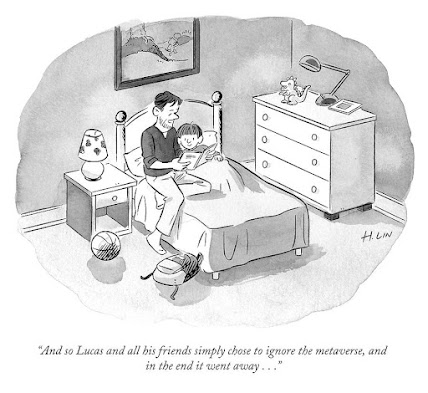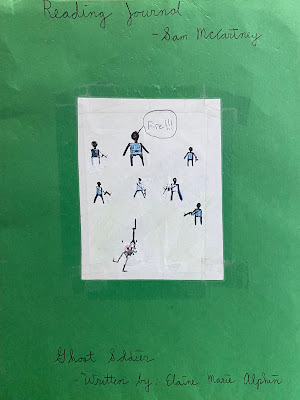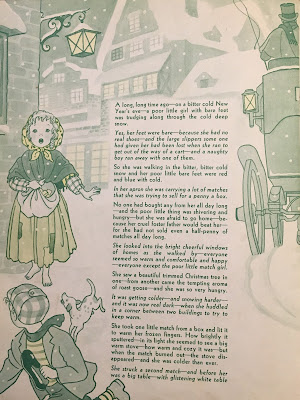The Girl Needs a Book!
You can pretty much count on it that someone, somewhere is always looking back
nostalgically. According to our wisest poets, nearly anything at any time can bring on a backward - glancing case of
"Nostalgia." You can even feel nostalgia for nostalgia: "
Man. When I was a kid, nostalgia was a lot better than that." Thus concludes a reader last month in the comments following
"Nostalgia economics is totally wrong," a pertinent essay by journalist Matthew Yglesias that turned up in my mailbox last month.
Around the same time, more nostalgia arrived in the form of "Grandpa," a memoir from my friend
Gene Ziegler, complete with this helpful etymology:
Nostalgia,
from the Greek nostos (meaning homecoming)
and algos (meaning pain).
Gene's thesis: maybe there's a way to "remember the homecoming part and block out any pain." For the sake of his
grandchildren and great - grands, he captures what it was like growing up in
Allentown, PA, in the 1940s, back when a happy home included one bathroom for all, an icebox -- not a refrigerator, a radio -- not a television, a front porch -- not an air-conditioner, a clothes line -- not a dryer, a
party line -- not a cellphone, but even so, one of the only phones on the block, so nothing to sneeze at! Looking back, Gene concludes:
These may seem like hard times by today’s standards, but they didn’t seem so at the time. I
never thought of us as poor, never went hungry, never felt deprived of things I wanted or
needed. I never felt threatened or unloved. Live was just simpler then. I’d have my trolly car back in a heartbeat.
I, too, could remember all those things; and what I wouldn't give for a trolley line! I also have Gene to thank for sharing the above
Weekly Reader cover of yesteryear, which took me straight back to elementary school,
homecoming pain and all. How could I have forgotten about that! The
Weekly Reader made us feel so grown up and important. How exciting when it was delivered (every Friday?) to our classroom.
One year we even got to “subscribe” and save each issue in a special binder, so at the end of second grade, we had “the year in review.” I saved mine for ages, but sadly ditched it somewhere along the way, probably in one of my college moves. That
Weekly Reader collection is definitely on the list of things I've thrown away and later wished to have back again, along with my junior high art portfolio. What was I thinking? No doubt, the Weekly Readers live on, somewhere online. But the artwork? Only in my mind.
"Never such innocence again . . ."
*************
Of all the reading I have been doing lately, here are three titles -- one memoir and two historical novels -- filled with nostalgia for an earlier, happier time:
1. Way back -- when Billy Crystal was a kid:
700 Sundays
by
Billy Crystal (b 1948)
84: "They [his parents] met at Macy's in 1935. They both worked there. Dad was in the legal department and my mom was in notions. She has this little notions counter where she sold stray thoughts, concepts and ideas." (84)
48: Billy describes the iconic moment in his childhood when none other than the legendary Billie Holiday (who was friends with his father) took him to see Shane at the movie theater. As the movie draws to a close and Shane rides off into the sunset, "Miss Billie whispered in my ear, 'He ain't never coming back.'"
56: "Heroes don't have to be public figures of any kind. Heroes are right in your family. There's amazing stories in all of our families, you just have to ask, 'And then what happened?'"
69 - 71: "May 30, 1956. Dad takes us to our first game at Yankee Stadium. . . . Someone took my program into the clubhouse, and it came out with several autographs on it, most notably Mickey Mantle's."
78 - 79: ". . . Remember that program Mantle signed in 1956? Well in 1977 . . . Mickey was a guest on the Dinah Shore show [along with Billy Crystal], and I brought the program, and he signed it again, 21 years later. We became good friends.
"In 1991 . . . an original seat from Yankee Stadium . . . was given to me. . . . Mickey signed the seat for me. It reads, 'Billy, wish you were still sitting here, and I was still playing.' When Mickey died, I thought my childhood had finally come to an end."
2. Way back --
Before We Were Yours (2017)
by
Lisa Wingate (b 1965)
Unlocking the cottage after a long absence:
139: "Bitter and sweet. Familiar and strange. The tastes of life."
When she loses sight of her little sister:
157: "The big boys don't answer when I ask where she is.
They just shrug and go on playing a game of conkers with the buckeyes
they pick up by the back fence.
Wondering why she doesn't
come to the beach more often:
114 - 115: "The answer tastes bitter, so I don't chew on it very long. Our schedules are always filled with other things. That's why.
"Who chooses the schedules we keep? We do, I guess.
"Although, so often it seems as if there isn't any choice."
3. Way back -- on "a March day that was like June" (88)
Mothering Sunday (novel: 2016 &
movie: 2021)
by
Graham Swift (b 1949)
3: "Once upon a time, before the boys were killed and when there were more horses than cars, before the male servants disappeared and they made do . . . with just a cook and a maid"
37: "All of her life she would try to see it, to bring back this Mothering Sunday, even as it receded and even as its very reason for existing became a historical oddity, the custom of another age."
117 - 18: "It was Mothering Sunday [March, 30] 1924. A different thing from the nonsense they call Mother's Day now. And she had no mother, you see. She was raised in an orphanage, then put into service. Another phrase you don't hear often these days."
The day she was born:
123: "It was hard to think now of a time when half the world was 'in service.' She was born in 1901 . . . and she would grow up to become a maid, which anyone might have predicted. But to become a writer -- no one could have predicted that."
The day she first saw herself as herself,
physically and intellectually:
87: "She had never before had the luxury of so many mirrors. She had never before had the means to view her whole unclad self. All she had in her maid's room was a little square of a mirror, no bigger than one of the hall tiles.
"This is Jane Fairchild! This is me!"
The day her boss offered
her a secondhand typewriter:
135: "And that, you might say, was when she really became a writer. The third time. As well as at birth. As well as one fine day in March, when she was a maid."
122: "This was the great truth of of life, that fact and fiction were always merging, interchanging. And if you were a maid you weren't given [your birthday] off. And being a maid was a little like being an orphan, since you lived in someone else's house, you didn't have a home of your own to go to.
"Except on Mothering Sunday. When you did get the day off, to go home to your family. Which would always put her at a bit of a loss."
*************
In a similar vein: A "
kind of monument to loss," the following poem by Philip Larkin captures "all that accumulated loss and grief" (124) that comes to the surface in Swift's
Mothering Sunday.
MCMXIV
Those long uneven lines
Standing as patiently
As if they were stretched outside
The Oval or Villa Park,
The crowns of hats, the sun
On moustached archaic faces
Grinning as if it were all
An August Bank Holiday lark;
And the shut shops, the bleached
Established names on the sunblinds,
The farthings and sovereigns,
And dark-clothed children at play
Called after kings and queens,
The tin advertisements
For cocoa and twist, and the pubs
Wide open all day;
And the countryside not caring
The place-names all hazed over
With flowering grasses, and fields
Shadowing Domesday lines
Under wheat's restless silence;
The differently-dressed servants
With tiny rooms in huge houses,
The dust behind limousines;
Never such innocence,
Never before or since,
As changed itself to past
Without a word—the men
Leaving the gardens tidy,
The thousands of marriages
Lasting a little while longer:
Never such innocence again.
Philip Larkin (1922 - 1985)
































